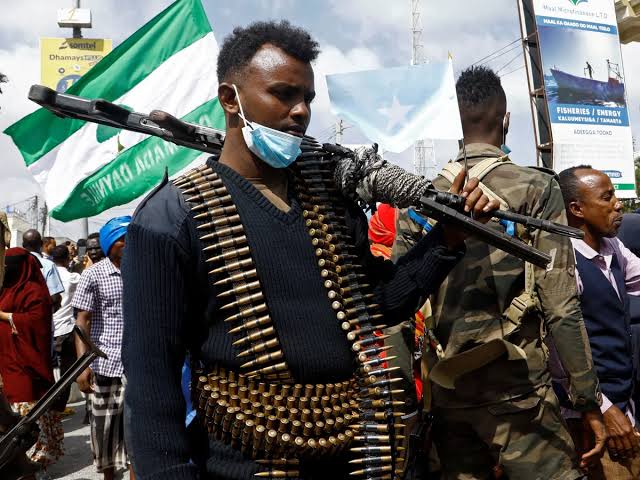Facebook Twitter (X) Instagram Somali Magazine - People's Magazine
The Somali government has accused Ethiopia of smuggling illegal firearms into Jubaland, escalating tensions in the region. According to reports, two Ethiopian planes allegedly delivered weapons to Kismayo, Jubaland’s port city, in recent weeks. Somalia claims these arms were intended to destabilize its government and bolster Jubaland’s leadership under Ahmed Madobe, who is at odds with Mogadishu.
In addition to transporting weapons, the Ethiopian planes reportedly carried Jubaland’s Deputy President Mahmud Seiyd Aden back to Ethiopia. Somalia has viewed these actions as a violation of its sovereignty, accusing Ethiopia of undermining its territorial integrity and supporting armed groups.
Political Friction Between Jubaland and Mogadishu
The accusations come amidst growing discord between Jubaland and Somalia’s federal government. Jubaland recently issued an arrest warrant for Somali President Hassan Sheikh Mohamud, following Mogadishu’s earlier arrest warrant for Ahmed Madobe, who was recently re-elected as Jubaland’s president for a third term.
This political standoff highlights the deep divisions within Somalia’s federal system, with Jubaland often resisting central authority. Ethiopia’s alleged involvement has added a new layer of complexity to these tensions, further straining relations between the two countries.
Ethiopia’s Coastal Land Deal With Somaliland
The arms smuggling allegations coincide with Somalia’s ongoing dispute over Ethiopia’s 2024 memorandum of understanding (MoU) with Somaliland. Under the deal, Ethiopia would lease 20 kilometers of Somaliland’s coastal land for 50 years, fueling accusations of territorial expansion. Somalia, which considers Somaliland an integral part of its territory, has criticized the agreement as undermining its sovereignty.
While Somaliland asserts its independence, Somalia continues to reject its self-declared autonomy. The MoU has exacerbated regional tensions, with Somalia accusing Ethiopia of interfering in its internal affairs.
Regional Mediation Efforts
In response to the growing crisis, Kenya has offered to mediate between Somalia and Ethiopia. Ethiopia’s Ministry of Foreign Affairs has expressed willingness to engage in talks, but Somalia has insisted on the revocation of the Somaliland agreement as a precondition for dialogue.
Regional analysts warn that unresolved tensions between the two nations could have broader implications for stability in the Horn of Africa. Egypt and Eritrea, long-time critics of Ethiopia’s policies, have voiced support for Somalia’s sovereignty claims, adding to the geopolitical stakes.
Ethiopia’s Silence on the Allegations
Despite the gravity of the accusations, Ethiopia has yet to officially respond. Its silence has further fueled speculation about its intentions in Jubaland and Somaliland. Observers note that Ethiopia’s actions could be part of a broader strategy to secure economic and strategic interests in the region, but such moves risk destabilizing its relationships with neighboring countries.
Looking Ahead
As tensions escalate, the need for diplomatic solutions becomes increasingly urgent. Regional actors like Kenya will play a crucial role in facilitating dialogue and preventing further conflict. However, lasting peace will require both Somalia and Ethiopia to address their underlying grievances and find common ground.

